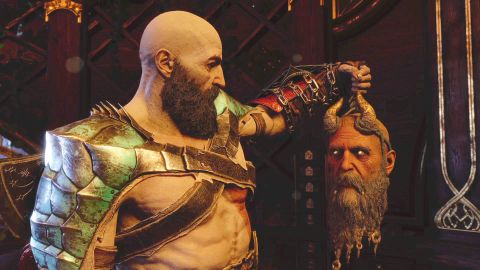Not going to lie, I was slightly scared to play God of War Ragnarok. What if it wasn't as good as the excellent 2018 reboot? What if it was [whisper it] just… okay? I loved the last game but it set a pretty high bar, one which Ragnarok just about brushes with outstretched fingertips. It's not quite as good as the last game, but it's damn close, and a God of War running at 90% is still better than most things out there.
Be better
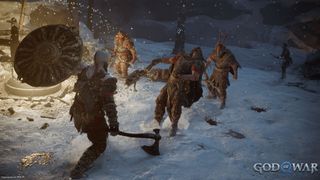
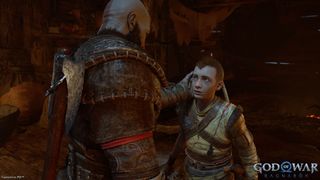
Release date: November 9, 2022
Platform(s): PS5, PS4
Developer: Sony Santa Monica
Publisher: Sony Interactive Entertainment
To be clear: God of War Ragnarok is a great game, with eventually weighty emotional moments, incredibly satisfying puzzles, and combat that's never less than enjoyable. The only thing letting it down is that developer Sony Santa Monica doesn't really know what to do with the first half of the experience. After an incredibly emotional opening (be warned, there will be tears) the wheels sort of spin for a while with no clear direction. There's always something to do, or an objective to chase, but some sort of spark is missing and the momentum that finally picks up and barrels you through the ending takes a while to get going.
The 2018 game crackled with energy as Kratos and Atreus struggled with grief and each other – the growing pains of both Kratos' fatherly responsibilities and Atreus' burgeoning adulthood could make almost any moment an emotional experience or friction filled clash of wills. "There are consequences…" Kratos famously states in the previous game during a key event, and here that doesn't feel the case for while. The pair operate as a functional team (more or less) and while Ragnarok is coming, little seems to change at first, leaving the literal apocalypse to feel more like a McGuffin to move characters around the plot. As a result, the opening hours struggle to find any sense of weight.
God of War Ragnarok is still great to play at this point, but for the first 15 hours or so it feels like it's treading water; stretched out and playing for time. Almost everything you do in this period has basically a minimal net gain. At best, you'll earn a small plot advancement that doesn't quite feel like adequate pay off for the time it took. After I spent half an hour collecting fruit I had no idea how the story was going to get to Ragnarok itself, and I was starting to worry that it didn't either.
End of days
However, once certain elements fall into place you can feel everything palpably kick up a notch, and the stakes aren't so much raised as thrown into the air. Past a critical point it's like having the 2018 game back – lines and events will make you gasp out loud, there are lump in the throat moments, probably some more tears, and scenes that burn themselves into your memory. Where the opening half is mostly amiable chit chat about maybe checking out the next objective, the closing feels like you're being repeatedly punched in the gut and the heart alternately until it's all over.
Kratos continues to be one of the most interesting character reformations in video games, and by the time the credits rolled I was happy for him in a way I wasn't expecting. He suffers most from the slow start, feeling barely present at times, but both he and Atreus ultimately go on a journey in every sense of the word. And, of the two, it's him that travels furthest. I obviously won't spoil anything, but by the end I didn't know if I wanted to do a private little air-punching 'yes!' or just rush up and hug that big beard.
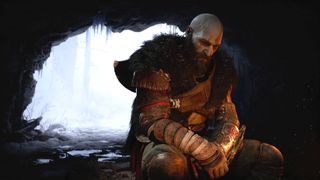
Nearly every character benefits when things take off and the script gets more meat to it. I never expected Sindri to be a firm favorite, for example. Thor is a flawed man and a layered villain in the mold of Balder. While Odin exudes an amiable, quietly spoken threat that leaks danger, usually more the nicer he gets. I'm not quite sure how well God of War Ragnarok handles certain elements of the plot that relate to abuse, addiction, and mental health, but I'll leave that to people with far more experience and wisdom than me to break down.
In terms of overall progression and gameplay, God of War Ragnarok feels a little more focused than its predecessor, often with more linear and direct paths to main objectives that reward you with an open area of side quests to explore once a crucial objective has been ticked off. There's also more in the way of puzzles – just about every door needs something spun, burned, or whacked in some way. They're just the right level of challenge to always feel satisfying, although it feels like the early stages are either playing for time or not big enough to properly space the puzzles out. At the start you can barely take a step without having to trigger a mechanism somewhere.
A god's work…
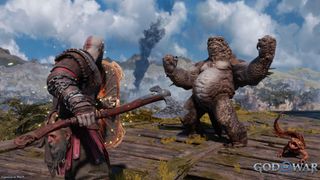
As the story picks up and becomes more meaningful, there's a little less busy work and the open areas you unlock expand in scope. They're all fairly self-contained but stack up, crisscrossing the realms, to create a pleasing raft of side missions to snack on – ghosts that need help, Nornir chests to open, fights and monsters to beat, and more. Earlier areas can be cleared quite quickly, and you'll rarely ever find a side quest that takes more than a few minutes, but by the time you're finished the story there's a generous helping of stuff to keep it going. One area in particular has a real endgame vibe as well, with a level of complexity and layering far exceeding the rest, which will take some time to unravel. I finished the story somewhere around the 35 hour mark, with a fair amount of wandering and side stuff under my belt and now, around 45-50 hours in, I'm still exploring and finding new stuff.
There's obviously a lot of fighting as you explore all this, and the combat continues to feel heavy and impactful, even as Ragnarok introduces more simplified systems. The core of combat is still balancing the focused icy damage of Kratos' Leviathan Axe to wail on single enemies, while the fiery hell of his Blades of Chaos burn everything around you. The enchantment system, which let you add buffs to gear in the previous game, has now been moved to a single amulet that can take nine enchantments. Each one buffs different stats like health, damage, and so on, but come as part of a trio – matching two or three of the set then powers up a different perk. It's much easier to manage a build in Ragnarok, particularly as different armor sets are more clearly focused on damage, cooldowns, Runic (magic) and other key stats.
I found God of War Ragnarok an oddly split experience overall. There's a light start that feels padded – still good but missing depth – which leads into a weighty finish that's every bit the equal of its predecessor. But despite feeling like a 15 hour story trying to fill a 30 hour game, God of War Ragnarok is still easily one of the best PS5 games. Even when it feels a bit thin, that's largely in comparison to the last game, with this maintaining that same absurd level of polish, and entertainment, even when the story feels like it's filling for time. When the dial does finally crank up to 11 you can feel it kick in, and by the end there are some incredible beats and a hugely satisfying resolution overall.
God of War Ragnarok was reviewed on PS5, with a code provided by the publisher.
